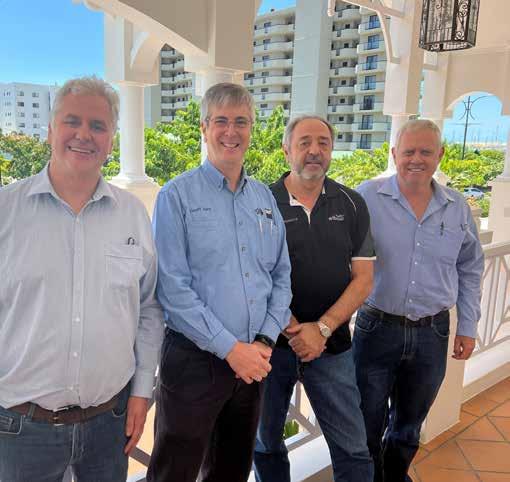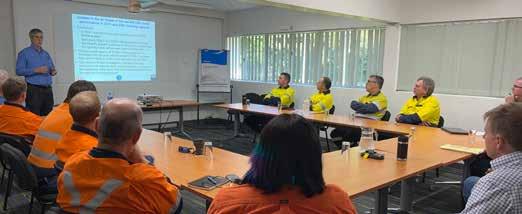
2 minute read
STRONG ATTENDANCE FOR MILLING REGIONAL RESEARCH SEMINARS
(Left) SRA’s Andrew Lynch, QUT’s Geoff Kent and Wilmar’s Jay Venning and Russell Kirk at the Townsville seminar.
(Below) The Meringa seminar was well attended.
Advertisement
RESEARCH TOPICS COVERED DURING THE SEMINARS INCLUDED:
STRONG ATTENDANCE
FOR MILLING REGIONAL RESEARCH SEMINARS
Around 100 milling representatives attended the Milling Regional Research Seminar series, jointly presented by Queensland University of Technology and SRA during March. Sessions were conducted at Gordonvale, Townsville, Mackay, Bundaberg and Rocky Point, with representatives of New South Wales industry joining the Rocky Point event through a virtual video link.
The sessions provided an update on milling research undertaken over the past 12 months.
QUT’s Geoff Kent said the sessions are an important opportunity to discuss research outcomes.
“We try and work in with the mills as best we can to choose a day in each location that suits them,” Geoff said. “It’s our key face-to-face opportunity to talk about research activities.
“With the Townsville event, working with Wilmar, one of the things we’ve tried to do is to tie it in with other events that they have planned. Their production superintendents, for example, get together on a regular basis. So, we do our session the day before or after one of those events.
“It’s important for us to hear from them what they think of our research. It’s not just about what we’ve done, but we can discuss what didn’t we do that perhaps we should have done. What are the benefits?
“They come with a mindset of ‘how does this apply to me?’ That’s incredibly valuable to a researcher to get an understanding of what the end-user wants to do with this. It does really focus the research that we do.”
Geoff said the sessions generated great discussion.
“We get a lot of discussion about all the topics. To be honest, there weren’t any topics that people weren’t interested in,” he said. • Reducing boiler maintenance costs and deferring capital expenditure through improved technology • Eliminating roll arcing • Strategies to minimise impacts of processing soft cane varieties, and industry cost/benefit analysis • Degradation modelling and condition-based maintenance for pressure equipment in sugar mills • Real-time measurement of extraneous matter and billet dimensions using machine learning • Investigations to mitigate the effects of juice degradation in factory evaporators on sugar recovery and quality, corrosion and effluent organic loading • NIR applications and current and planned SRA research activities • Defining minimum vapour pressure supply to batch grade pans • Configuring evaporator stations to provide bleed vapour to batch pan stages • Managing losses associated with the Maillard reaction in C massecuite processing • Use of a purge sensor on batch centrifugals to improve fugalling performance.
SEE THE FOLLOWING PAGES FOR SUMMARIES AND ARTICLES ON SOME OF THE RESEARCH INITIATIVES PRESENTED AT THE SEMINARS.











